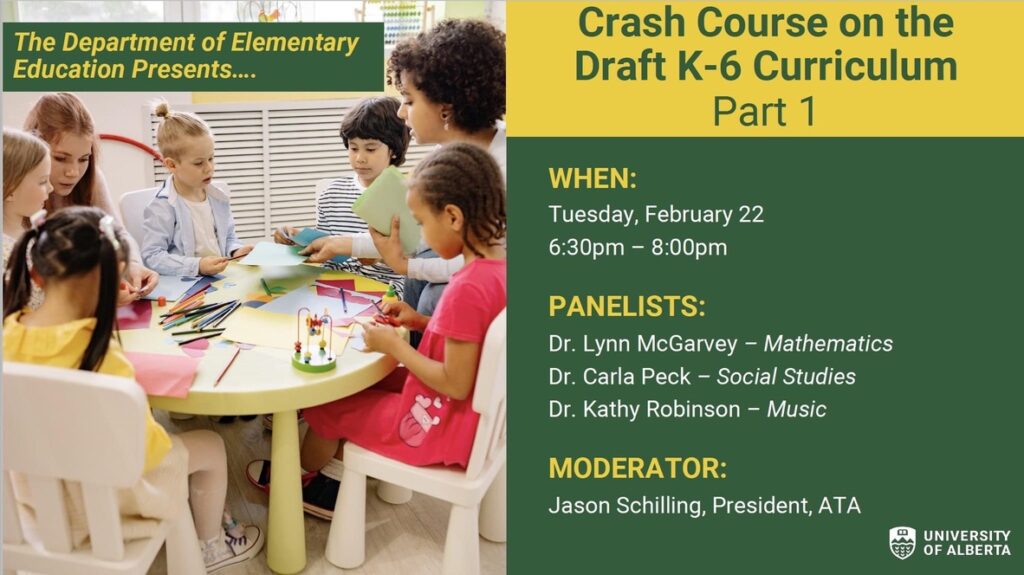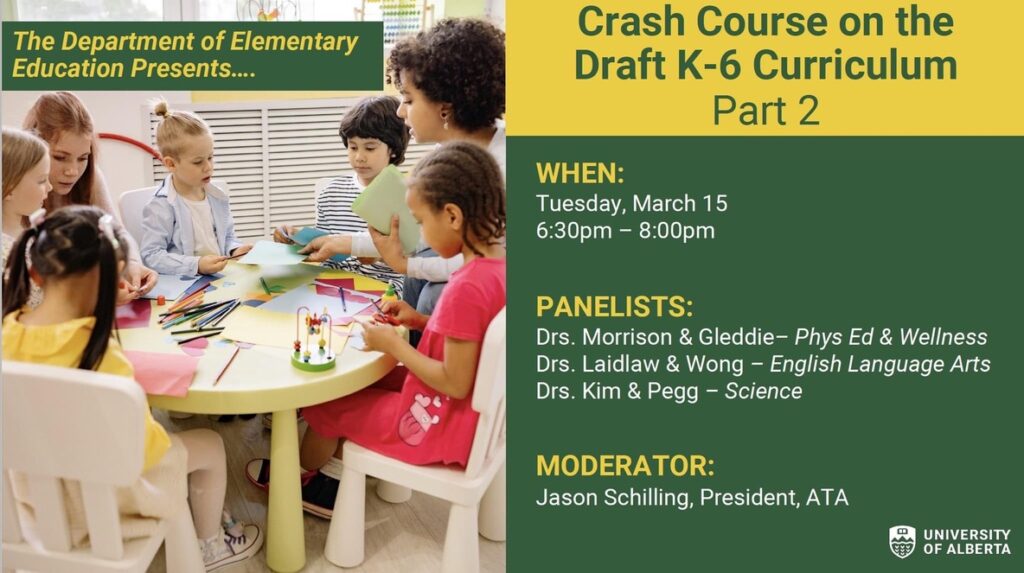The Department of Elementary Education in the Faculty of Education at the University of Alberta hosted two public information sessions on the draft K-6 curriculum. The first session was held on February 22, 2022 and the second session was held on March 15, 2022.
Links to video recordings of the webinars are provided below.
As the Government of Alberta moves closer to implementing its proposed curriculum for K-6 students in the Fall of 2022, concerned education professionals, experts and parents continue to question whether the controversial curriculum will in fact prepare students for future success as learners and citizens. But not everyone has the time or knowledge to evaluate curriculum documents and determine if students’ best interests are being served.
Timeline of Curriculum Development, 2019 – 2022
Experts from the University of Alberta’s Department of Elementary Education hosted a two-part “crash course” to help members of the general public assess the strengths and areas of concern in the draft K-6 curriculum in order to support meaningful public discussion and informed feedback to the provincial government.
All presenters are professors in the Department of Elementary Education who have expertise in the subject areas that were addressed in the two sessions. The goal of the webinars is to help parents, grandparents, and other members of the general public better understand the strengths and weaknesses of the curriculum that the government has developed, some of which will be taught to students as early as September 2022.
Part 1: Mathematics, Social Studies, and Music (February 15, 2022)

Dr. Lynn McGarvey, Vice Dean, Faculty of Education, and Professor, Department of Elementary Education. Dr. McGarvey is a mathematics education professor in the Faculty of Education at the University of Alberta. Her research focuses primarily on the mathematical understanding of children, youth, and preservice and inservice teachers within the context of spatial and algebraic reasoning. She is currently serving as Vice-Dean for the faculty.
Dr. Carla Peck, Professor, Department of Elementary Education, and Director, Thinking Historically for Canada’s Future. Dr. Peck’s teaching and research focus on (1) teachers’ and students’ understanding of key democratic concepts such as diversity and citizenship and (2) students’ historical thinking, and in particular, the relationship between students’ ethnic identities and their understandings of the past. Dr. Peck has been involved in various aspects of curriculum development in Alberta, Canada, and internationally. She serves as a consultant on numerous boards and advisory groups for provincial, national, and international history and civic organizations and regularly provides workshops for K-12 teachers. Before moving west, Carla taught elementary school in New Brunswick.
Dr. Kathy Robinson, Associate Professor, Department of Elementary Education. Dr. Robinson holds degrees from Lebanon Valley College, Northwestern University, and the University of Michigan and has years of teaching experience in elementary and middle school general music and chorus in Pennsylvania, Illinois, New York and South Africa. She has presented and published research focusing on world music pedagogy, Ghanaian and South African musics, culturally responsive pedagogy and urban music education. Dr. Robinson has also given more than 100 workshops and clinics on 5 continents focusing on teaching world musics for elementary classroom and general music teachers, and choral directors and on culturally-responsive pedagogy.
Part 2: Physical Education & Wellness, English Language Arts & Literature, and Science (March 15, 2022)

Dr. Hayley Morrison, Assistant Professor, Department of Elementary Education. After teaching and consulting in Ontario, Dr. Morrison decided to pursue her passion of research and professional development by supporting practitioners – pre-service teachers, in-service teachers, and educational assistants – to provide meaningful movement experiences for students with disabilities in physical education. Dr. Morrison is an advocate for movement experiences for all. She loves spending her time dancing, exploring the outdoors, and playing sports like slo-pitch, volleyball, and soccer.
Dr. Douglas Gleddie, Associate Dean, Faculty of Education, and Professor, Department of Elementary Education. Dr. Gleddie is a husband and father who also happens to be a Professor at the University of Alberta. In a career filled with change, the only true constants have been physical activity/education, working with kids and, how joy fills the spaces in between. Although it took him a while to fully embrace this epiphanal thought, the journey itself has enabled Dr. Gleddie to work with a wide variety of people and organizations across Canada and around the world. He takes care of his own wellness by playing with his family, learning to play guitar and attempting back-flips (on a trampoline…).
Dr. Linda Laidlaw, Professor, Department of Elementary Education. Dr. Laidlaw’s research in Language and Literacy Education focuses on digital and mobile technologies in primary education, and she is particularly interested in the relationship between children’s digital practices at home and their experiences at school. Her latest projects aim to develop new frames and strategies for literacy education in a changing world.
Dr. Suzanna Wong, Adjunct Professor, Department of Elementary Education. Dr. Wong’s research in Language and Literacy Education focuses on young children’s literacy practices at home and in school. Her current research project, “A longitudinal study of children’s multiliteracy practice’ in ‘out-ofschool’ settings” focuses on children’s literacy practices in- and out-of-school environments and their perspectives of these literacy practices.
Dr. Mijung Kim, Professor, Department of Elementary Education. After Dr. Kim completed her PhD at the University of Alberta, she further developed her research programme on embodied cognition and science inquiry through postdoctoral research at the University of Victoria, Canada and Seoul National University, Korea. Through various teaching and research experiences in the different parts of the world, Dr. Kim has developed knowledge and understandings of context-based curriculum and teaching and learning as sociocultural relations. Dr. Kim is currently a co-director of the Centre for Mathematics, Science, and Technology Education in the Faculty of Education.
Dr. Jerine Pegg, Chair and Professor, Department of Elementary Education. Dr. Pegg’s scholarship focuses on the areas of science education, teacher professional learning, and faculty mentoring. Her current research explores various aspects of interdisciplinarity and partnership development through the lenses of social network theory, boundary interactions, and communities of practice. Prior to becoming chair, Dr. Pegg served as the Department of Elementary Education Associate Chair (Undergraduate) and Co-director of the Centre of Mathematics, Science, & Technology Education.